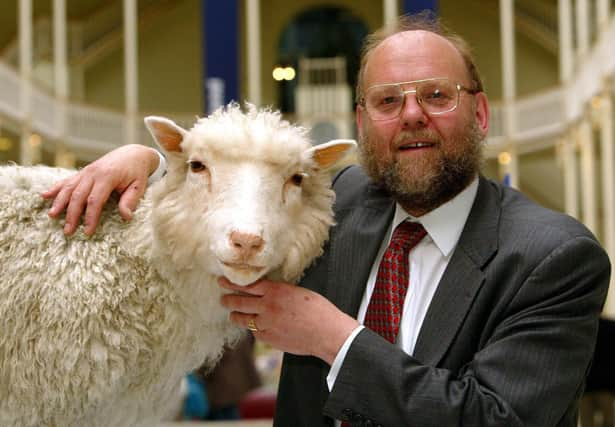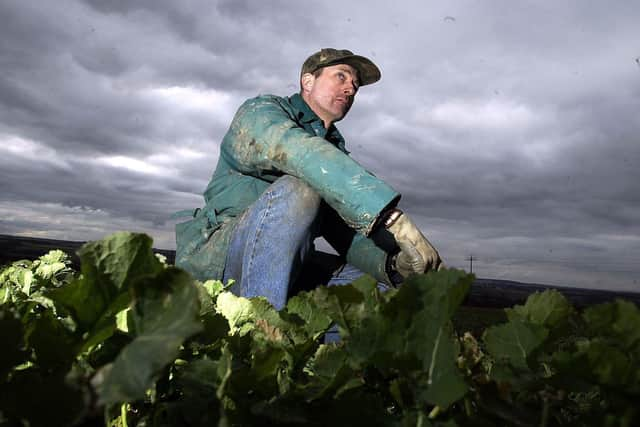25 years on, what is the legacy of Dolly the Sheep, and what future for GM food?


It was only a tin of tomato puree, but it created a stink that lingered for years.
The 25th anniversary of the first genetically modified food to go on sale in a British supermarket merits scarcely a footnote in retailing history, yet it heralded a new scientific era. That same year, Dolly the sheep, the first mammal to have been successfully cloned from an adult cell, made her debut at Edinburgh University.
Advertisement
Hide AdAdvertisement
Hide AdThe cans of concentrated California puree that went on sale at Sainsbury’s and Safeway in February 1996 had been produced from the “flavr savr” tomato , a strain from which the rotting gene, not to mention most of the vowels, had been removed. The bioscience company Zeneca had spent 10 years perfecting the process, and said the result was a stronger tasting sauce that “stuck better to pasta”.


Critics, however, called it “Frankenstein food” and some threatened a boycott. The Prince of Wales said the implications of genetically modified cops were “enough to send a cold chill down the spine”.
The tins stayed on the shelves for three years before demand subsided and the range was withdrawn. Today, Britain remains one of the few developed nations where such crops are not grown commercially, although modified oilseed rape, soybean, cotton-seed oil, maize and sugar beet are allowed to be imported.
But it is politics, not science that is holding back the tide, according to one Yorkshire expert.
Advertisement
Hide AdAdvertisement
Hide Ad“As a scientist, and taking into account the laws and safety procedures that are in place, I don’t see a problem,” said Dr Dougie Clarke of Huddersfield University’s School of Applied Sciences.
“They create higher yields, there is less food waste and in third world countries where growing food in arid conditions is a problem, they now have drought-resistant crops that they can grow and sustain.”
The issue, he said, was that while politicians were content to be led by science in their response to illness and disease, they were less willing to listen to the arguments for genetic modification.
“The British government is more worried about the public’s opinion than they really should be,” he said. “I understand that people are concerned that these modified crops might begin to wipe out the natural variety, but there are very good control measures in place to prevent that happening.”
Advertisement
Hide AdAdvertisement
Hide AdThe campaign group Genewatch UK takes the opposite view, calling for protection for plants and animals from contamination by genetically modified organisms, and a ban on activities that would compromise “human rights and food security”.
The argument goes far beyond crops, and as Dr Clarke pointed out, the work carried out in Edinburgh 25 years ago had been the catalyst for many important medical developments.
“In 1996 we were leading the world with Dolly the sheep, and the one good thing that the British government allowed was research in stem cells, which can replace damaged tissues, whereas America banned it at one stage.”
Dolly’s arrival on July 5 1996 was for a while one of the world’s best kept secrets. It was not until the following February that news of her birth was made known.
Advertisement
Hide AdAdvertisement
Hide AdScientists produced her by inserting DNA from a single sheep cell into an egg and implanting it in a surrogate mother.
In America, President Bill Clinton set up a task force to examine the legal and ethical implications of cloning, but 25 years later the process has manifested itself in unexpected ways.
Quite apart from the medical research it engendered into Parkinson’s Disease and other conditions, it spawned an industry in “pet cloning” for the benefit of people who cannot bear to say goodbye to a loved animal.
“Many people will pay to get a copy of their pet. Companies in America and South Korea have been specialising in this since 2001,” said Dr Clarke. “The first dog to be cloned was an Afghan hound.
Advertisement
Hide AdAdvertisement
Hide Ad“But the same technology is also being used for something of real use, in the cloning of sniffer dogs that are used to search out explosives or drugs. Only a very small number usually make the grade, but Korean scientists managed to clone a golden Labrador retriever that was renowned for its sniffing abilities, and made several clones of it.
“Not everyone likes the idea of that, but it’s clear that good can come from cloning.”
Human closing, however, would likely remain beyond the pale, he said. “In theory it’s completely possible, but no-one has done it and most people would consider it totally unethical.”
Opinion was divided when Dolly the cloned sheep – apparently named after the singer Dolly Parton – was revealed to the world. Critics feared that the technique could be used to artificially produce humans, a prospect described by Dr Ian Wilmut, who led the team of scientists behind the project, as “repugnant” as well as illegal.
Advertisement
Hide AdAdvertisement
Hide AdBut he said the work would “enable us to study genetic diseases for which there is presently no cure”.
Many animal rights activists were horrified at the development, and the Church of Scotland said that while the work was “fascinating”, it had reservations about the implications.
Support The Yorkshire Post and become a subscriber today. Your subscription will help us to continue to bring quality news to the people of Yorkshire. In return, you’ll see fewer ads on site, get free access to our app and receive exclusive members-only offers. Click here to subscribe.
Comment Guidelines
National World encourages reader discussion on our stories. User feedback, insights and back-and-forth exchanges add a rich layer of context to reporting. Please review our Community Guidelines before commenting.